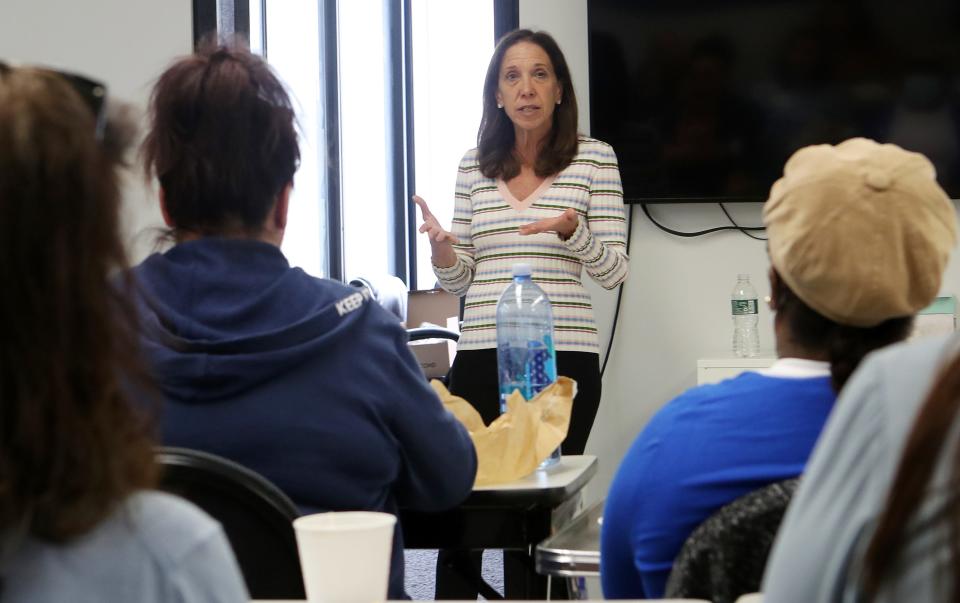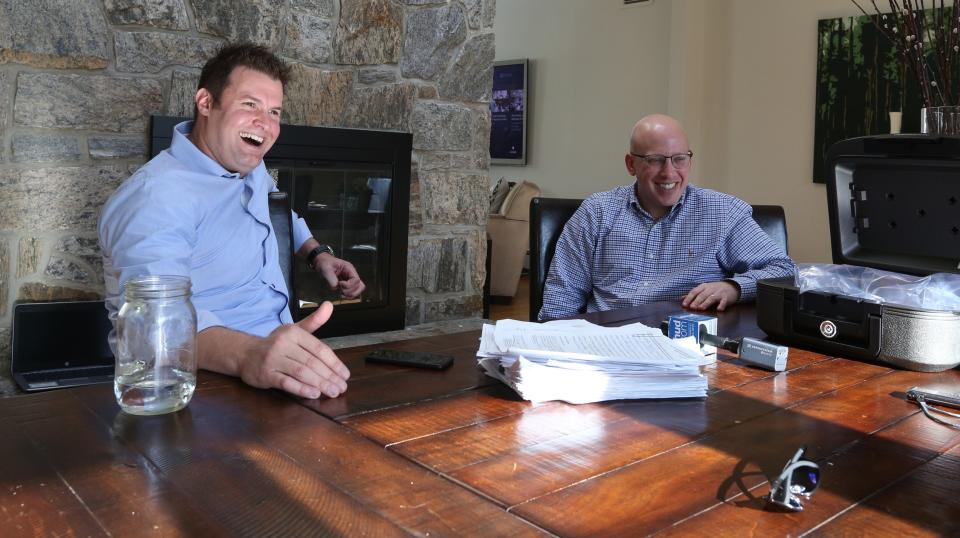Stewart-Cousins, Paulin clash over Edgemont incorporation in last days of Albany session
- Oops!Something went wrong.Please try again later.
- Oops!Something went wrong.Please try again later.
An end-of-session push for reforms of New York's village incorporation laws, spearheaded by Senate Majority Leader Andrea Stewart-Cousins, could create roadblocks for activists in her Senate district who want to create Greenburgh’s seventh village in the hamlet of Edgemont.
Activists say they want a village because their hamlet has been neglected by the Town of Greenburgh. They have seen Greenburgh Supervisor Paul Feiner reject two petitions since 2016 that would have allowed a vote on whether to create Westchester’s first new village since Rye Brook was established in 1982.
Edgemont Incorporation Committee leader Jeff Sherwin recalled a recent meeting with Stewart-Cousins, at which she told him: "New York doesn't need another village."
Edgemont's activists don't want new rules at this stage of the game.
But Stewart-Cousins, who said Sherwin took her statement out of context, said an updated process for village incorporation is needed, citing the gridlock she has witnessed in Greenburgh over the past seven years.
A two-pronged state Senate plan evolved out of a study she commissioned from the Elisabeth Haub School of Law at Pace University, which for now will require a financial impact study of village incorporation. By 2024, new village petitions would first have to be approved by a state commission before coming for a local vote.
Stewart-Cousins: 'Only grown-up in room'
Stewart-Cousins said there may be less drastic ways for Edgemont, with a population of about 8,000, to feel respected by town government in a municipality with 95,000 residents — about half of whom live in the town's six villages. Her attempt in 2019 to convene a mediation session between Edgemont leaders and Feiner failed after the Greenburgh supervisor declined to participate.
"I’ve been the only grown-up in the room, and I have done everything I can to try to resolve this in a way that everybody can be respected," she said. "You really need to figure out what you really need. What do you really need? Representation on the town board? I'm not sure you need to be an independent village."
The issue has set up a battle between Stewart-Cousins, D-Yonkers, and Assemblywoman Amy Paulin, D-Scarsdale, who both represent Edgemont in Albany.

Paulin said the last-minute introduction of the bills in the 2023 session’s final week was problematic. Stewart-Cousins said the Senate would vote on its village bills Friday, scheduled to be the last day of the session.
It's uncertain whether companion bills in the Assembly will be voted on by Friday.
“The bills are sloppily written, unclear, and could end up preventing a vote on incorporation for the people of Edgemont, who have been seeking a vote for seven years,” Paulin said. "That's not right."
When it began: Edgemont incorporation kick-off in 2016
Setback: Court rules against Edgemont incorporation petition
Feiner's role: Supervisor's intervention draws fire
Edgemont's seven-year fight
At stake is the future of Westchester’s largest town, with six villages, 10 school districts, three fire districts and its unincorporated area, which includes the hamlets of Hartsdale, Fairview and Edgemont.
Edgemont is the town’s premier hamlet, with a Scarsdale postal address, an elite school district, a stretch of the Central Avenue business district, and high-value homes that provide an outsized contribution to the town budget. Edgemont village advocates say they would consider shared service agreements with the town on services such as sanitation and police.

But Feiner has waged a spirited fight against incorporation, rejecting the advocates' first two petitions in actions later upheld in state Supreme Court and by its appeals panel.
There are two bills in play in Albany.
One measure sponsored by Stewart-Cousins would establish a state village incorporation commission, with members appointed by state officials, who would decide whether a petition for incorporation would move forward for a community vote, based on a study of a village’s feasibility.
The state in recent years has encouraged the consolidation of New York's myriad local governments, not the creation of new ones.
"Let's get an independent arbiter," said Stewart-Cousins. "Pace discovered what we had figured out — that the supervisor was not the most objective person in this situation."
Edgemont would not come under the commission’s jurisdiction because the advocates have already collected an estimated 1,400 signatures for its third petition.
The second bill, sponsored by state Sen. James Skoufis, D-Woodbury, would require a financial study on the impact of incorporation, both on the residents of the proposed village, and the remainder of the unincorporated area of the town. His bill also would quadruple the minimum number of residents for a new village from 500 to 2,000.
Both Paulin and Sherwin fear the requirement for a study in Skoufis' bill would present another opportunity for Feiner to seek court intervention if he didn’t like the study's conclusion. The town has already spent an estimated $250,000 in legal fees to strike down the first two petitions.
The Edgemont committee has twice lost in state court when it appealed Feiner’s rejection of its petitions, based in part on questions about the boundaries of the Greenville Fire District that have been in force for a century.

“On its face, the requirement for a study seems reasonable,” Sherwin said. “But Feiner was also unwilling to accept the boundaries of the fire district that’s been in existence for more than 100 years. How does one know what would be acceptable?”
Feiner and Stewart-Cousins, however, say the new law would provide better oversight over the proliferation of local governments. Stewart-Cousins included $100,000 in the state budget this year for the Rockefeller Institute in Albany to conduct a study of the impact of Edgemont incorporation.
Feiner looks forward to the study's conclusions.
“The goal is to give people on both sides information to help decide the future,” said Feiner. “We think it’s going to be catastrophic. I’m pretty sure the Rockefeller Institute is going to recognize that incorporation is not going to work.”
Sign up for Wilson's weekly newsletter for insights into his Tax Watch columns.
David McKay Wilson writes about tax issues and government accountability. Follow him on Twitter @davidmckay415 or email him at dwilson3@lohud.com.
This article originally appeared on Rockland/Westchester Journal News: Edgemont NY incorporation at odds between Stewart-Cousins, Paulin

